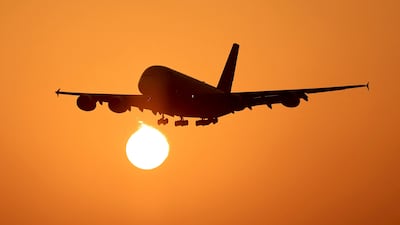Live updates: Follow the latest news on Cop28
Aviation industry figures at Cop28 pushed back against criticism of the sector's carbon emissions, reiterating their commitment to decarbonisation but stressing the need for more support from governments and the private sector.
Executives called for financial help to boost the production of sustainable aviation fuels (SAF), which are needed for the sector to achieve its target of net-zero by 2050.
The airline industry accounts for about 3 per cent of global CO2 emissions and serves only a small percentage of the world's population, but it acknowledges its environmental impact and is working on several pathways to decarbonisation.
And at climate summits, the optics of world leaders jetting in on commercial planes or private jets only fuel criticism from activists.
International Civil Aviation Organisation
"Sometimes I wonder why the focus is on aviation so much because there are so many other sectors that contribute as much or even more," said Teresa Parejo, head of sustainability at Iberia Airlines.
"People need to understand that aviation is critical for the well-being of many countries, even vulnerable ones that depend on tourism.
"It's not just people who want to have fun that travel. Aviation creates jobs and wealth and is critical for humanitarian purposes.
"We are the ones most interested in moving towards sustainability, we want SAF. It is so critical to us because it's a move from fossil fuels to a sustainable way of transportation – but we need help."
Other executives at the summit in Dubai's Expo City voiced their concern that the sector's sustainability efforts are not visible enough to the public eye.
"We have done so much but we're terrible at explaining it and announcing it to the world," Jane Hupe, chief of the environmental unit at the International Civil Aviation Organisation (ICAO), said.
"Please let's do more outreach, let's talk about what aviation is doing. Let's make the world understand where we are, because we are so advanced and sometimes I hear people talking about things we resolved 15 years ago."
The International Air Transport Association believes SAF could contribute more than 60 per cent of the emissions reduction needed in aviation globally by 2050 but airlines are struggling to buy enough to power flights.
The scale of production remains small and the clean fuel is two to three times more expensive for airlines to buy than conventional kerosene.
Industry executives also called for supportive government policies to incentivise increased SAF production and diversify feedstocks that are available locally to reduce its price.
"We need governments to take action to send the market signals to scale SAF alongside industry policy, with 40 countries with SAF policies in place or under discussions," said Yasar Yetiskin manager of SAF at global consultancy ICF.
Last month, a UN-led conference in Dubai agreed on a target to reduce carbon emissions from global aviation by 5 per cent by 2030 through the use of SAF.
The International Civil Aviation Organisation (ICAO)'s third Conference on Alternative Aviation Fuels (CAAF/3) agreed on a global framework that would increase the supply and use of these cleaner fuels.
The framework sends a clear signal to policymakers, investors and fuel producers on the opportunities available in the aviation sector's energy transition, according to the ICAO.
Unlocking supply to meet demand is the challenge that needs to be solved but the investment burden cannot fall to airlines alone, executives said.
"When we talked to financial organisations before [CAAF/3], they said they need consistency, predictability and a framework," Ms Hupe said.
"We did it, now give us the money. We need the money to do it, help us get the money," she said.
Maryam Al Balooshi, the UAE's state lead negotiator for aviation climate change, said SAF is the future and low carbon aviation fuels will be key in the transition from jet kerosene.
"The government fully supports the energy transition," she said.
"I hope that we move gradually with the wisdom that we don't harm the two sectors – aviation as well as energy."


